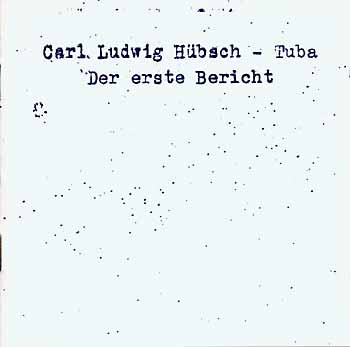Der erste Bericht
Carl Ludwig Hübsch / Tuba Solo
Considering the dearth of good solo tuba recordings in recent years Carl Ludwig Hubsch would be in a field of his own even if he didn`t try to be different. DER ERSTE BERICHT (“the first report”) acknowledges the inevitable novelty charge with a Cover of Kashmir – we don`t get many Led Zeppelin covers in these pages either but what persists is Hubsch`s contro, and, yes, poetry with an instrument that, for jazz, was long relegated to huffing in the end zone. Creating overtones by singing through his horn, he extends his instrument the way Albert Mangelsdorff stretched the trombone, while his drumming on the side of the instrument in M5 and Ross 780 adds a third party. Away from those extensions, he has astounding control of his instrument`s softer range, as the reverie of Groombridge 34 affirms so handsomely.
Coda Magazine July 2000
Liner Notes: “Narratio prima” is the title Nicolaus Copernicus chose for his first book, published in 1540: a “first report” (“erster Bericht”) about an iconoclastic reinterpretation of cosmic order, replacing the traditional geocentric concept with the revolutionary model of a heliocentric universe.
Why should a tuba player name his first solo record after Copernicus? And why should he select the titles of his improvisations according to the cosmic objects listed in the star catalogues compiled by the French astronomers Charles Messier (“M1”, “M2” etc.) or Nicolas Louis de Lacaille?
“I know virtually nothing about astronomy”, Carl Ludwig Hübsch claims (a statement which is more a reflection of his innate modesty than a true representation of the facts), and his music is certainly not “cosmic music” in the obvious way such references to astronomy may imply. Neighter do his pieces attempt to mirror cosmic proportions, nor are they based on the visual structures of star charts (like John Cage’s orchestra piece “Atlas Eclipticalis” or his “Etudes Australes” for piano).
Hübsch’s titling procedure could thus seem to be no more than just another elegant way of circumnavigation the dilemma many contemporary improvisers face when forced to name their spontaneous creations. But there is more to it than that. For the Cologne-based musician the history of astronomy is a model for the eternal human quest for structure and meaning within a chaotic universe, a striving for clarity and content which also permeates the activity of musical improvisation. Astronomers do not observe “reality”, but interpret unknown worlds according to manmade models and principles. In fact, the astronomer, peering into space, is bound to discover his own mirror image, or, as Hübsch puts it: the object of observation is invariably the observer himself. And the same certainly applies to man’s attempts to find order in the cosmos of sound. Improvisers and listeners are intent on finding “objective” structures, but, in fact, they discover themselves. Making music and listening to music are nothing but lifelong processes of selfdiscovery and soul-searching. And so Carl Ludwig Hübsch’s orbit through the infinite cosmos of tuba-modulated sounds reflects his own story as a composer and improvisor, his own sonic worldview.
Knowing that Hübsch, apart from his training as a brass player, also studied percussion and singing, it may not come as a surprise that this virtuoso tuba player should explore the percussive and vocal extensions of brass technique in depth. In “Ross 780”, Hübsch not only gradually transforms the tuba into a complete drum kit, but also manages somehow to add a melodic line on top. And “M5” is nothing less than a complete polyrhythmic drum choir – plus vocals. Other pieces investigate the eerie soundworld of a reed-blown tuba (“M3”) or the multiple possibilities of extended multiphonic techniques (e.g. “Lacaille 8760”, “Wolf 424”), and “M6” transcends the traditional physical limits of wind instrument phrasing, utilizing eivculat breathing to build continuous, richly modulated multiphonic layers. Following Hübsch’s journey through tuba space, one comprehends that the tuba is far a filter and modulator for the entire panorama of human vocal expression.
But “Der erste Bericht” is not just a survey of tuba territory. Even if some of Hübsch’s sonic miniatures are virtuoso showcases, one should not overlook another, no less impressive aspect of Hübsch’s playing: his ability to built coherent structures and explore subtle nuances within a strictly confined sonic area, abstaining from the spectacular effects of “extended techniques” e.g. in the pianissimo world of “Prokyon” or the motivic cell proliferations of Goombridge 34″.
In other words: Carl Ludwig Hübsch is not only a first-rate tuba player, but also world-class musician – as can be witnessed on this CD, or in Hübsch’s playing in his own ensembles (“PostNoBills”, “Planet Blow”, “Massnahmen”, among others) and his various sideman activities with the likes of Lester Bowie Henry Threadgill, Thomasz Stanko and the ICP ensemble. “Der erste Bericht”: Welcome to tuba space, and welcome to the sound of music.
Peter Niklas Wilson
